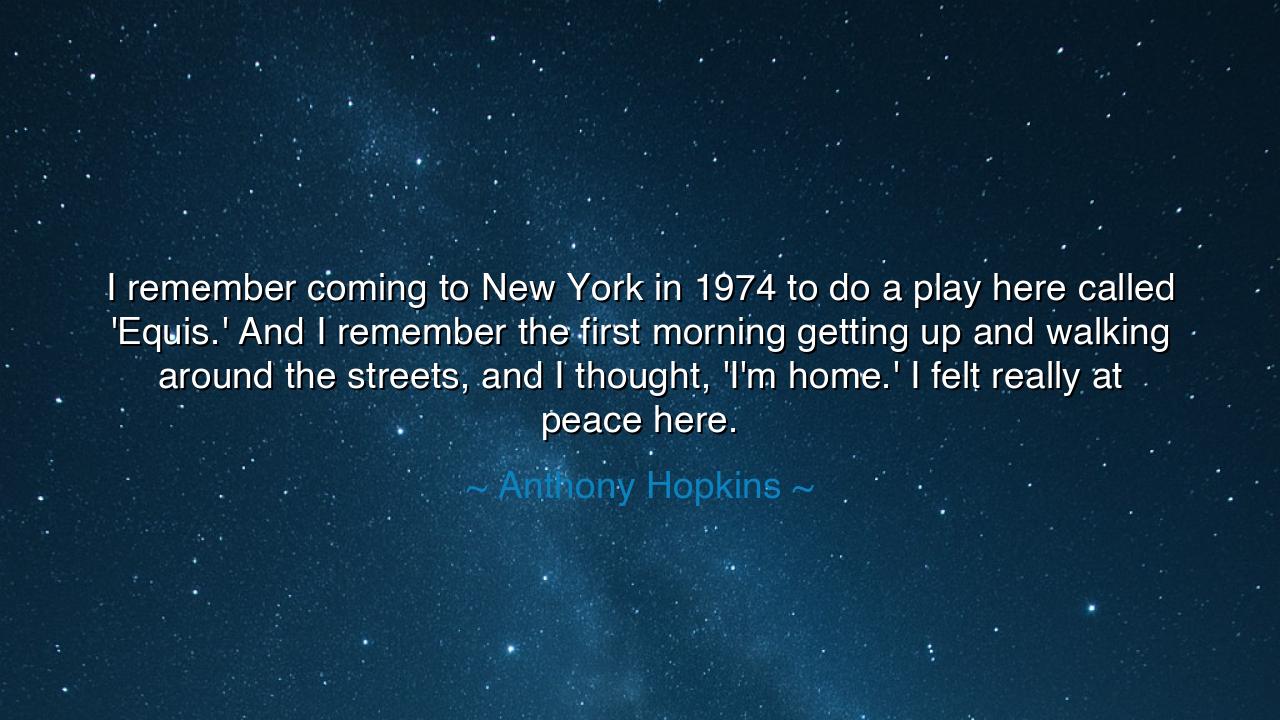
I remember coming to New York in 1974 to do a play here called
I remember coming to New York in 1974 to do a play here called 'Equis.' And I remember the first morning getting up and walking around the streets, and I thought, 'I'm home.' I felt really at peace here.






"I remember coming to New York in 1974 to do a play here called 'Equus.' And I remember the first morning getting up and walking around the streets, and I thought, 'I'm home.' I felt really at peace here." — Anthony Hopkins. These words reflect a profound sense of belonging, of finding a place where one's spirit feels at ease. For Anthony Hopkins, the bustling streets of New York City offered not just a backdrop for his craft, but a deep sense of peace that resonates with the ancient longing for a place where one can truly be oneself. In the same way that the ancient wanderers sought a place where their hearts could rest after a long journey, Hopkins’ words evoke the universal human desire to find a home, not just in a physical sense, but in the very marrow of the soul.
In the ancient world, the concept of home was deeply intertwined with identity. The Greeks and Romans believed that a person’s true home was not merely a place of residence, but a place where they felt deeply connected and in harmony with the world around them. For Odysseus, returning home to Ithaca was not just the end of a long journey but a return to his true self, a place where his identity could be fully realized. The ancient wanderer, whether traveling to distant lands or seeking meaning in their own soul, often longed for the moment of homecoming—a sense of peace and fulfillment that could not be found in any other place. Hopkins’ experience of arriving in New York and feeling at peace mirrors this ancient longing for a homecoming, a place where one’s spirit is in harmony with their surroundings.
Consider the journey of Aeneas, the Trojan hero whose fate led him to found Rome. His long journey, filled with trials and tribulations, was not just a physical journey but an inner quest for meaning and purpose. When Aeneas finally reached his destined land, he experienced a sense of fulfillment and peace, a realization that his journey had brought him to a place where he could build a future. Hopkins’ experience in New York similarly reflects the idea of destiny—the sense that there are moments in life when the journey comes to an end, and we find ourselves in the place we were always meant to be. His words suggest that New York, with its vibrancy and energy, became his Ithaca, a place of deep personal peace and belonging.
In Rome, Cicero often wrote about the importance of peace of mind and finding one's place in the world. For Cicero, true fulfillment came not from external achievements, but from an inner peace and sense of purpose. His letters often spoke of the importance of returning to the simple joys of life, of finding a place of balance and harmony. Hopkins’s recollection of New York as a place where he felt at peace, where he found a deep sense of belonging, echoes this ancient wisdom. Just as Cicero sought peace in his own life amidst the political tumult of Rome, Hopkins found solace in the chaos of New York—a city of motion, but also a city where he could be himself, grounded and whole.
In modern life, the idea of home is still as powerful as it was in the ancient world. Today, many of us are constantly in search of a place or a moment where we can feel at peace—a place that calls to our soul and offers us the chance to rest and rejuvenate. In the fast-paced, often tumultuous world of modern society, it can feel difficult to find such a place. Yet, just as Hopkins found peace in New York City, we too can find moments of peace amidst the chaos of our daily lives. Whether through travel, work, or relationships, the journey to find home is often as much about our inner peace as it is about the physical space we inhabit.
The lesson of Hopkins’ words is that home is not simply a place; it is a state of being. It is about finding a place where we can feel authentic, where we can breathe deeply and simply exist in the moment. It is a reminder that, much like Odysseus, Aeneas, and the great thinkers of ancient times, our search for home is an ongoing journey, and when we find it, we are able to unlock a sense of peace and fulfillment. It’s a reminder that, no matter where we are in the world, there is always a place where we feel we belong—if not in the physical sense, then in the deeper, more spiritual connection to the world around us.
In your own life, take time to seek the places and the moments where you feel at peace, where your spirit feels at home. It may not always be a place of stillness and quiet—it may be a bustling city, like New York, or it may be a quiet room where you can reflect. But know that home is not just a destination; it is a feeling, an internal peace that we can cultivate by remaining connected to our truth and embracing the places and people that bring us closer to who we truly are. Just as Hopkins found his peace in a bustling city, we too can find our peace within the journey of life, wherever it may lead us.






AAdministratorAdministrator
Welcome, honored guests. Please leave a comment, we will respond soon